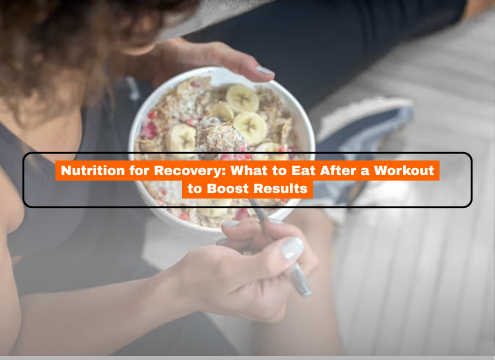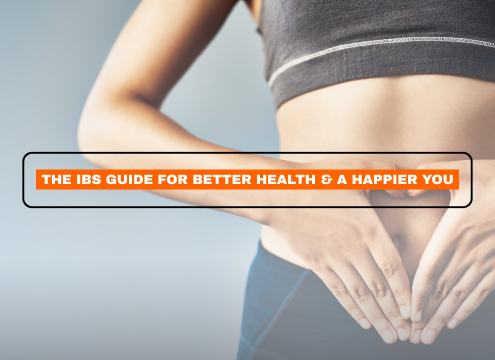We often emphasize pre-workout meals to fuel performance, but what you eat after your workout is just as important—if not more.
Post-workout nutrition plays a critical role in how well you recover, how quickly you bounce back, and how effectively your body adapts to your training. Whether your goal is muscle gain, fat loss, or enhanced endurance, recovery nutrition is key.
So, what should you eat after a workout? When should you eat? And how much of each nutrient do you really need?
Let’s break it down with science-backed clarity.
💪 Why Post-Workout Nutrition Matters
Every time you train, especially with strength or high-intensity workouts, you create micro-damage in your muscles and use up your body’s stored energy (glycogen).
Proper recovery nutrition helps with:
- Replenishing glycogen stores in the muscles
- Repairing and rebuilding muscle fibers
- Reducing post-exercise inflammation and soreness
- Rehydrating and restoring electrolytes
- Improving future workout performance
Without proper post-workout fuel, your muscles may not recover optimally, which could lead to:
- Fatigue
- Reduced strength in future sessions
- Increased risk of injury
- Slower progress
⏰ When to Eat: Timing is Key
⏱️ The “Anabolic Window”
Experts suggest that the ideal time to eat post-workout is within 30 to 60 minutes of finishing your session.
Why? Your muscles are more sensitive to nutrient uptake right after exercise. Insulin sensitivity is higher, and your body is actively repairing and rebuilding.
While you won’t lose all your gains if you miss this window, sooner is better—especially if you haven’t eaten in the hours before your workout.
🍽️ What to Eat After a Workout
The best post-workout meals contain a combination of carbohydrates, protein, and a small amount of healthy fats. Let’s dive into each one.
🍞 1. Carbohydrates: Refill Your Energy Tank
Your body stores carbs in the form of glycogen, primarily in your muscles and liver. During workouts, these stores are depleted—especially with endurance or high-intensity training.
Post-workout carbs help:
- Replenish glycogen
- Prevent muscle protein breakdown
- Restore energy levels
- Support immune function
✅ Top Carb Sources:
- Brown rice, white rice (fast-absorbing)
- Oats or oatmeal
- Quinoa, millet, sweet potatoes
- Whole-grain toast or rotis
- Fruits like bananas, mango, apple, berries
- Smoothies with fruit + yogurt
How much?
- Aim for 1–1.2 grams of carbs per kilogram of body weight after intense training.
🍳 2. Protein: Rebuild and Repair Muscles
Protein provides the amino acids your body needs to repair damaged muscle fibers and build new ones. Without enough protein post-workout, you may delay recovery and muscle growth.
✅ Top Protein Sources:
- Eggs or egg whites
- Tofu or tempeh
- Paneer (Indian cottage cheese)
- Lentils, chickpeas, beans
- Greek yogurt or curd
- Protein shakes (whey, casein, or plant-based)
- Chicken or fish (for non-vegetarians)
How much?
- Aim for 20–40 grams of protein after your workout.
- Combine with carbs for maximum muscle protein synthesis.
🥑 3. Healthy Fats: Recovery with Balance
Fats are not the enemy—but they should be consumed in moderation post-workout. A small amount of healthy fat can reduce inflammation, support hormone production, and keep you satisfied.
Avoid heavy, fried, or greasy meals right after training.
✅ Best Fats for Recovery:
- Nuts (almonds, walnuts, cashews)
- Seeds (chia, flax, sunflower)
- Nut butters (in moderation)
- Avocado
- Coconut milk (in smoothies or curries)
Keep fat intake light in your post-workout meal to avoid slowing down digestion.
🥤 4. Hydration and Electrolyte Replenishment
Sweating during workouts causes fluid and electrolyte loss, which can lead to fatigue, cramps, and poor recovery.
✅ Hydrate smart:
- Drink 2–3 cups (500–750 ml) of water post-workout
- Add coconut water for natural electrolytes like potassium and magnesium
- Include lemon water or herbal teas to aid detox and hydration
If you’ve had a long or particularly sweaty session, consider adding a pinch of Himalayan salt or an electrolyte mix to your water.
🍓 5. Bonus: Antioxidants for Muscle Repair and Reduced Inflammation
Exercise increases oxidative stress temporarily, which can lead to inflammation and muscle soreness. Antioxidant-rich foods help combat this stress and speed up healing.
✅ Best Choices:
- Berries (blueberries, strawberries, blackberries)
- Spinach, kale, amaranth
- Turmeric (with black pepper)
- Green tea
- Cacao or dark chocolate (in moderation)
Add these to your post-workout meals or snacks for a recovery boost.
🥗 Sample Post-Workout Meals (Vegetarian-Friendly)
🧋1. Quick Smoothie (when on the go)
- 1 banana
- 1 scoop whey or plant protein
- 1 tbsp peanut butter
- 1 cup almond or soy milk
- 1 tsp chia seeds
✅ ~25g protein | ~40g carbs | ~12g fats
🥣 2. Oats + Curd Bowl
- ½ cup oats
- ½ cup plain curd
- 1 tbsp flaxseeds
- Mixed berries or banana slices
- Drizzle of honey (optional)
✅ ~20g protein | ~40–50g carbs | ~10g fat
🍲 3. Paneer Stir-fry + Brown Rice
- 100g paneer sautéed with bell peppers and spinach
- 1 cup cooked brown rice
- Side of cucumber salad
✅ ~30g protein | ~50g carbs | ~12g fat
🥗 4. Tofu Quinoa Bowl
- ½ cup cooked quinoa
- 100g grilled tofu
- Steamed broccoli and carrots
- Sprinkle of sesame seeds
- Dressing: lemon + olive oil
✅ ~30g protein | ~40g carbs | ~10g fat
🍳 5. Scrambled Eggs + Toast
- 2 whole eggs + 2 egg whites
- 2 slices multigrain bread
- Sautéed spinach or tomatoes
✅ ~25g protein | ~30g carbs | ~10g fat
🧠 Common Mistakes to Avoid After Your Workout
- Skipping your post-workout meal: Your muscles are hungry for nutrients. Skipping meals delays recovery and limits your results.
- Eating only protein: Carbs are just as important! Without them, your body may break down muscle tissue for energy.
- Overloading on fat: Fat slows digestion. Too much fat post-workout can delay nutrient delivery to muscles.
- Forgetting to hydrate: Even mild dehydration impacts strength, focus, and recovery.
- Eating too late: Waiting too long to eat after your workout misses the anabolic window and can hinder recovery.
📌 Quick Guide: Ideal Post-Workout Plate
| Nutrient | Why it Matters | Examples |
| Carbs | Restore glycogen | Rice, oats, banana, sweet potato |
| Protein | Repair muscle | Eggs, tofu, curd, lentils, whey |
| Fats (small) | Reduce inflammation | Seeds, nuts, avocado |
| Antioxidants | Fight stress | Berries, greens, turmeric |
| Hydration | Replenish fluids | Water, coconut water, lemon water |
💬 Final Words: Recover Right to Perform Better
Your post-workout meal isn’t just about “eating something.” It’s a strategic opportunity to fuel recovery, support strength gains, and prepare your body for your next session.
Remember, consistency beats perfection. You don’t need fancy superfoods or supplements. Focus on:
- Balanced meals
- Natural, whole foods
- Proper timing
- Hydration and rest
Train hard. Recover smart. Repeat.





